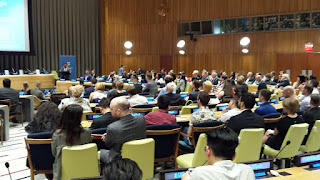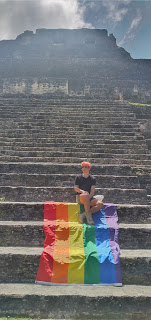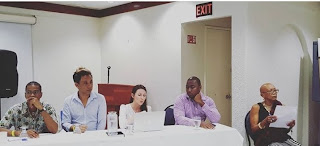Belize's and Guyana Dont Ask, Don't Tell: So?
19th, November, 2012
We hear about the United States "don't ask don't tell" policy, but have never looked at specific laws in Belize's Defense Force that can be used to release a gay or lesbian soldier from the force. The United Belize Advocacy Movement reviewed particular sections of the Belize Defense Force Act and found vague sections that applied to the idea that legislative stigma can very easily be perpetuated by vague laws or vindictive commanders if they so chose.
Section 60 of the Defense Force Act spoke to "scandalous conduct of officers," but conveniently does not define the term scandalous conduct. The specific section exact wording is as follows:
Every officer subject to military law who behaves in a scandalous manner, unbecoming the character of an officer, shall, on conviction, be dismissed with disgrace.
What exactly is unbecoming the character of an officer is open broadly to interpretation and as such, open to abuse. When compared with section 62 of the Act we fine the term" unnatural kind." Again, the section does not spell out what unnatural kind is referring to, whether consenting or forced. The wording for section 62 speaks to disgraceful conduct as follows:
Any person subject to military law who is guilty of disgraceful conduct of a cruel, indecent or unnatural kind shall, on conviction, be liable to imprisonment for a term not exceeding two years or any less punishment provided by this Act.
While there is no disagreement for the need to maintain law and order among solider, our work is to explore the implication of vague language in law and its impact on the gay and lesbian population in Belize. The two sections mentioned is complemented by a third section. Interestingly enough, section 66 refers to conduct to prejudice of military discipline. It's wording speaks to the following:
Any person subject to military law who is guilty of any conduct or neglect to the prejudice of good order and military discipline shall, on conviction, be liable to imprisonment for a term not exceeding two years or any less punishment provided by this Act.
One can ask the broad question, are we grasping at straws in our interpretation? Are we seeking to fine a problem where none exists? The answer to that is simply no, as the case of Selgado vs Attorney General Office, Minister of Defense and Security Commission action no. 418 of 2003 spoke to the following:
..given the tendency of attorneys and judges in Belize of accepting without questioning, what is considered legally right in the USA, Canada and especially England, despite vast differences in social views, Captain Selgado might have put up a formidable sex discrimination case under S:16 of the constitution of Belize, even a constitutional motion case, had he owned up to homosexuality..(Justice Awich)
When we look at a country like Guyana, a case recently came to light about two women who's sexual relations were documented on a cell phone, then it went viral the story shared that there is a "dont ask dont tell" policy and that the women were given a choice. See full story below:
We hear about the United States "don't ask don't tell" policy, but have never looked at specific laws in Belize's Defense Force that can be used to release a gay or lesbian soldier from the force. The United Belize Advocacy Movement reviewed particular sections of the Belize Defense Force Act and found vague sections that applied to the idea that legislative stigma can very easily be perpetuated by vague laws or vindictive commanders if they so chose.
Section 60 of the Defense Force Act spoke to "scandalous conduct of officers," but conveniently does not define the term scandalous conduct. The specific section exact wording is as follows:
Every officer subject to military law who behaves in a scandalous manner, unbecoming the character of an officer, shall, on conviction, be dismissed with disgrace.
What exactly is unbecoming the character of an officer is open broadly to interpretation and as such, open to abuse. When compared with section 62 of the Act we fine the term" unnatural kind." Again, the section does not spell out what unnatural kind is referring to, whether consenting or forced. The wording for section 62 speaks to disgraceful conduct as follows:
Any person subject to military law who is guilty of disgraceful conduct of a cruel, indecent or unnatural kind shall, on conviction, be liable to imprisonment for a term not exceeding two years or any less punishment provided by this Act.
While there is no disagreement for the need to maintain law and order among solider, our work is to explore the implication of vague language in law and its impact on the gay and lesbian population in Belize. The two sections mentioned is complemented by a third section. Interestingly enough, section 66 refers to conduct to prejudice of military discipline. It's wording speaks to the following:
Any person subject to military law who is guilty of any conduct or neglect to the prejudice of good order and military discipline shall, on conviction, be liable to imprisonment for a term not exceeding two years or any less punishment provided by this Act.
One can ask the broad question, are we grasping at straws in our interpretation? Are we seeking to fine a problem where none exists? The answer to that is simply no, as the case of Selgado vs Attorney General Office, Minister of Defense and Security Commission action no. 418 of 2003 spoke to the following:
..given the tendency of attorneys and judges in Belize of accepting without questioning, what is considered legally right in the USA, Canada and especially England, despite vast differences in social views, Captain Selgado might have put up a formidable sex discrimination case under S:16 of the constitution of Belize, even a constitutional motion case, had he owned up to homosexuality..(Justice Awich)
When we look at a country like Guyana, a case recently came to light about two women who's sexual relations were documented on a cell phone, then it went viral the story shared that there is a "dont ask dont tell" policy and that the women were given a choice. See full story below:
| Female Guyanese soldiers in same-sex relations can stay or leave; GDF's policy is 'Don't Ask, Don't Tell' |
|
| Written by Denis Scott Chabrol |
| Monday, 19 November 2012 18:23 |
 One
of two female Guyana Defence Force (GDF) soldiers, who were involved in
a same-sex relationship, has accepted counselling and has chosen to
remain in the army that has a ‘don’t-ask don’t-tell’ policy on sexual
orientation, acccording to a high ranking officer. One
of two female Guyana Defence Force (GDF) soldiers, who were involved in
a same-sex relationship, has accepted counselling and has chosen to
remain in the army that has a ‘don’t-ask don’t-tell’ policy on sexual
orientation, acccording to a high ranking officer.Requesting anonymity, the officer said the other soldier told her superiors that she is comfortable with her sexuality and would opt to voluntarily leave the military institution. The senior military command officer emphasised that the two females have not been fired but have been given three months up to December 31 to decide whether or not they wanted to remain in the GDF. Originally the females, said to be in their early 20s, had been ordered Struck Off Strength at their own request , another source told Demerara Waves Online News (www.demwwaves.com ). The female privates were several weeks ago summoned to meetings after a video of them engaged in sexual activity punctuated with expletives and references to an orgasm began circulating among soldiers. The video went viral after someone found a cellular phone and accessed its contents. According to the officer, the issue at hand was whether the owner of the phone had taken enough steps to lock her phone to prevent unauthorized access and distribution of the video. DemWaves has learnt that all soldiers have been instructed to cease distribution of the videos and anyone caught with it in their phones would be sanctioned. The high level military source insisted that the GDF’s ‘Don’t Ask, Don’t Tell’ policy is also reflected in the deletion of the question “Are you a homosexual?” four years ago from documents that must be completed at the time of enlistment. At the same time, according to the source, the GDF has formulated a policy against sexual harassment. The officer said that heterosexual and homosexual activities and any amorous behaviour are prohibited on all military bases and as such offenders could be cited for misconduct. Soldiers are not prohibited from having same-sex relations in the privacy of their own premises as is the case with heterosexuals once it does not bring the GDF into disrepute, the high ranking official. “At the end of the day, this is a matter of rights and freedom of choice,” the officer added. The GDF, according to the senior officer, was mindful of moving too far ahead of the Guyana government on the matter of sexual orientation. For its part, the Guyana government has long given a commitment to the United Nations Human Rights Committee that national consultations would be held on the thorny issue. At the same time, the 15-nation Caribbean Community (Caricom) has been crafting model legislation to essentially repeal a number of laws that infringe on sexual orientation. They include the criminalization of cross-dressing and sodomy. Several male homosexuals, who were arrested and prosecuted several years for wearing female garb, are awaiting the outcome of a constitutional case in the High Court. (source:http://www.demerarawaves.com/index.php/201211194992/Latest/female-guyanese-soldiers-in-same-sex-relations-can-stay-or-leave-gdfs-policy-is-dont-ask-dont-tell.html) So whats the point of telling this story and that of Selgado, simply, sometimes internalized fears cripple gay and lesbian individuals in their ability to stand up for themselves in a way that is honest. Also, the fact that Selgado felt he had to deny is sexual orientation in such a public arena suggest as a community we have a long way to go in protecting and upholding our human dignity in whatever situation that may occur. The Selgado case for example showed that even in addressing legal protection issues individuals from the gay community do not feel that their dignity can be upheld in a court of law, if they are honest about their sexual orientation. Time will tell and more work needs to be done around community mobilisation to ensure that the L.G.B.T is aware and confident enough to demand rights enforcement. |




Comments
Post a Comment